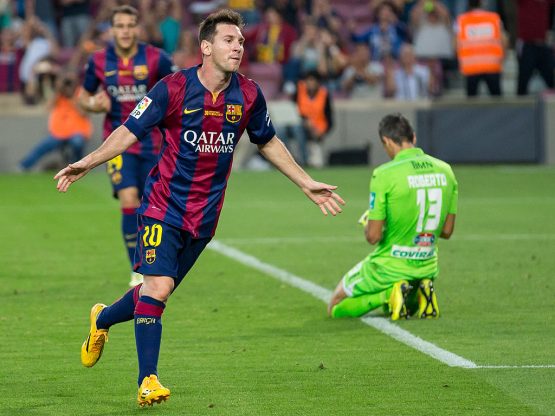
Lionel Messi lifting the 2022 World Cup trophy meant a stellar career by one of the most extraordinary soccer talents ever had been rewarded to the fullest. At 35 years of age, likely in his last World Cup, the Argentine delivered one of the tournament’s best-ever individual campaigns in Qatar. As his nation’s captain, Messi posted seven goals and three assists, including two goals in the final facing France. On top of cementing Messi as the greatest soccer player of this generation, the win established his presence on the list of the best athletes in history.
A hold of the most prestigious prize in all of sports evaded Messi for years, accentuated by a heartbreaking 2014 final loss at the hands of Germany. With this World Cup slated to be the last chance at the ultimate glory for once-in-a-lifetime players such as Messi, Cristiano Ronaldo, Neymar and Luis Suarez, citizens in most countries closely followed the tournament. By the time the World Cup came to an end, people everywhere were deeply touched by the monumental achievement of Argentina and its captain.
In the United States, though, nothing out of the ordinary was felt. For the most part, there was no emotion, cheer or celebration, which speaks to the country’s need for connectivity with sports culture worldwide.
Messi does not fit the mold of what the average American team sports fan might consider a prime athlete. In a nation where tall, hefty athletes like Tom Brady and Lebron James are widely considered the best sportsmen, Messi’s 5-foot-7, 150-pound frame would automatically disqualify him from this listing. Just as one of the faces of soccer is derided by sports audiences in the United States, the sport itself often faces ridicule. Many regard it as an unsophisticated children’s game — a less relevant sport than the “Big Four” sports which include basketball, football, hockey and baseball. It is almost as if soccer was the unliked cousin among team sports in the U.S. — it is tolerated but still has a hard time reaching mainstream acceptance.
The narrative around the disdain towards soccer in the U.S. often concerns the idea that its popularity is associated with accessibility — it is only necessary to have a ball and some space to play it — lowering its status. Soccer is indeed more approachable than the “Big Four” sports worldwide, and it is also the most popular team sport among children. However, it is certainly not less important than typical American sports. Instead, it is significantly more impactful on a global scale.
The United States would do well by fully embracing the power of soccer. As a nation, America should leave behind its ambivalence and borderline contemptuous take on soccer and embrace its impact as a connector between people and countries. Americans can do this by acknowledging the sport by its more commonly-known names of football or futbol. This would send a powerful message that American soccer is joining the rest of the world. In addition, this would position the nation as a partner of the international soccer community, instead of a hierarchically superior member of it. This begins with an acceptance of a completely different style of sport than the “Big Four,” exemplified by the fact that stature has no relation to skill.
In fact, a significant component behind the influence of soccer is the lack of importance attributed to the players’ size as criteria to compete and excel. In basketball, the taller a player is, the better the chance they have of making it as a professional. The same goes for football players and their weight. The most popular sport in the world is also the most diverse in terms of its players’ dimensions due to the game’s position-based aspect, encapsulated well by Messi throughout his career. Due to his position as a forward, he tends to run at defenders, who, on average, are some of the tallest players on the field. Messi’s size allows him to change directions quicker with the ball at his feet, which, combined with his surprising upper-body strength, gives defenders a slim chance of dispossessing him. Of course, though, Messi’s story goes beyond being the underdog due to size.
Messi was born in Rosario, Argentina, and although he dominated local competition, he was deemed too small to compete professionally by coaches. When he was 13, Spanish club Barcelona signed him and paid for his growth hormone treatment that he completed at 14. This move would pay off for Barcelona, as Messi became the club’s all-time leader in appearances, goals and assists. He won 10 La Liga trophies, four Champions League titles and his first six Ballon d’Or during his time with Barcelona.
It took him longer to succeed with his nation, though. Unlike in traditional American sports, this point is very valuable to a soccer player’s legacy. Messi lost in the final of the Copa America three times, as well as one World Cup final before 2021. After losing the 2016 final against Chile where Messi painfully missed his penalty in the shootout, he received stark criticism from Argentinian media and announced his retirement as the team’s captain. However, fans came to their star’s support, urging him to change his mind, which Messi did months later. In 2021, Messi led Argentina to its first major title in over two decades in the Copa America, which was held in Brazil, and won a seventh Ballon d’Or. A year later, Messi won the most important trophy of all: the World Cup.
Messi did not need to win World Cup glory to legitimize his career. He was already considered a once-in-a-lifetime player by fans, commentators and players. As time evolves, fans of the sport will look at a player’s accomplishments and other stats to determine their overall judgment of them. Messi’s collection of achievements was already prodigious. Winning the World Cup, particularly with the leadership, focus and talent he displayed, was the last piece in his fantastic career.
It is challenging to compile a rank of the greatest athletes in history. One might prioritize, for instance, a player’s talent in their respective sport or the impact left on the teams and countries they have represented. But, whatever criteria one uses, Messi has brought even more significance to soccer, as well as a lot of happiness and awe to fans.
Messi masters various skills simultaneously in a sport that seems simple, but is full of subtitles. And he does that for his talent alone — he is not incredibly talkative or attention-seeking. His captivation of billions worldwide comes simply from his magic on the field. He is also the best current example of the power of soccer to provoke universal emotions and bring people together.
Just like most sports worldwide, soccer has its problems, ranging from corruption to racism, which spreads faster and is more challenging to contain due to the sport’s popularity. Tournaments such as the World Cup shed light on these problems but also serve as a distraction from these inevitable issues. The U.S. will have an amazing opportunity to take soccer seriously as the co-host (together with Mexico and Canada) of the 2026 World Cup. Messi’s trajectory should inspire the United States and open Americans’ eyes to the potential of soccer as a conciliatory approach toward other nations.













